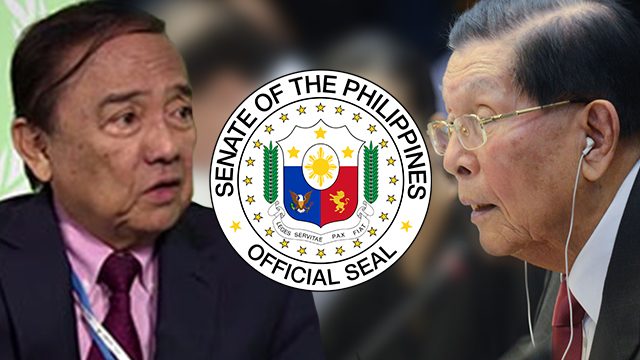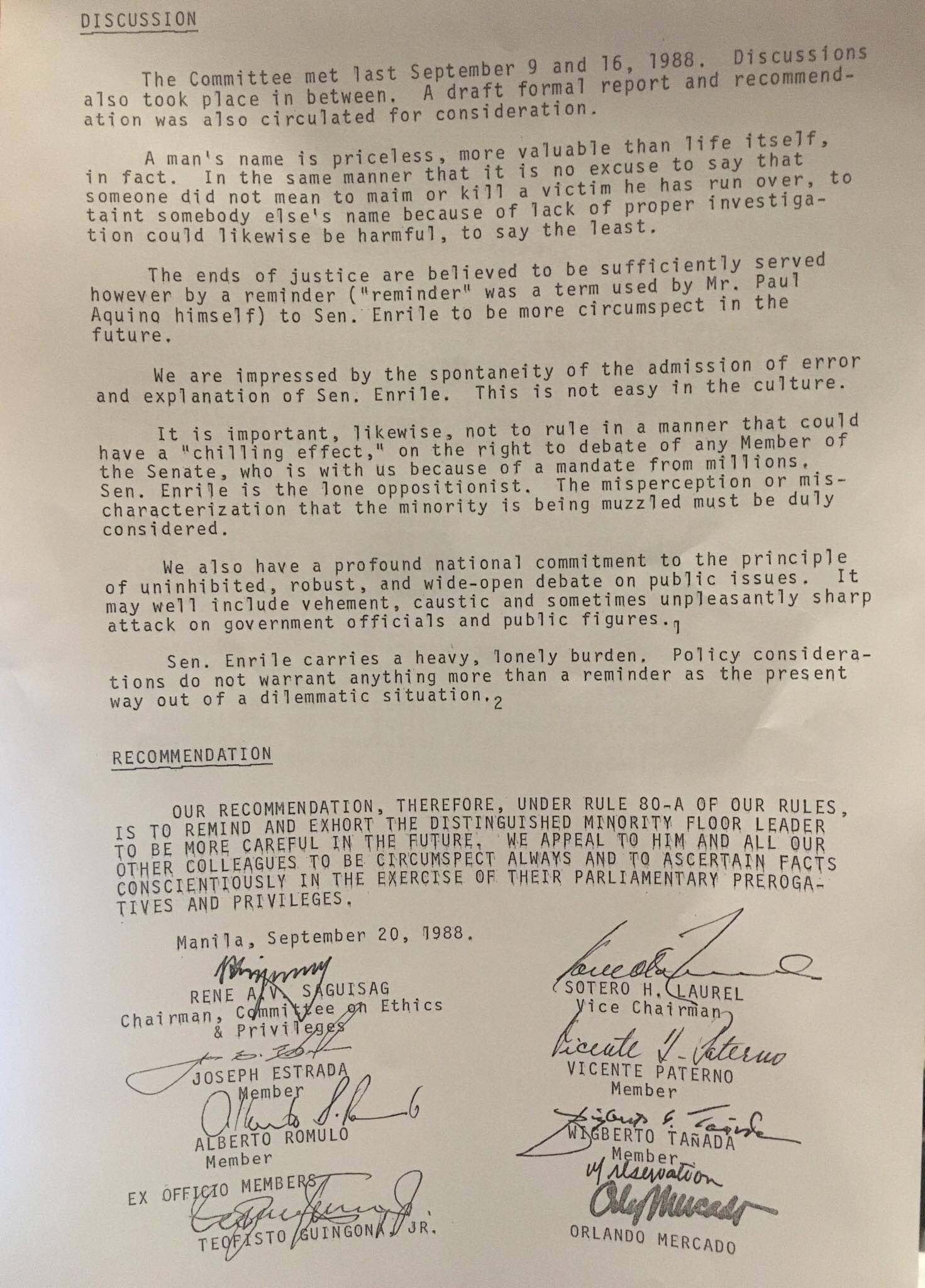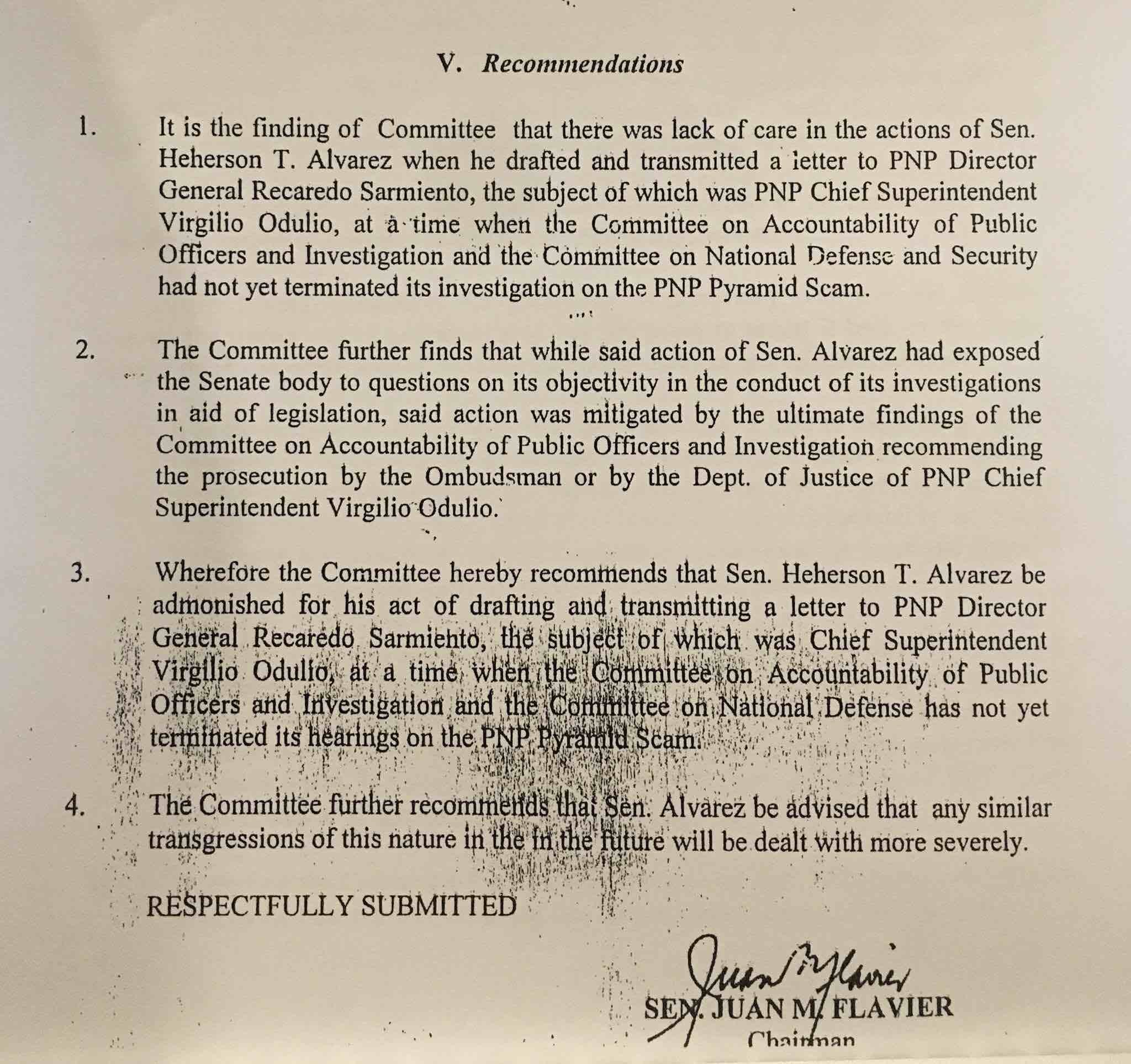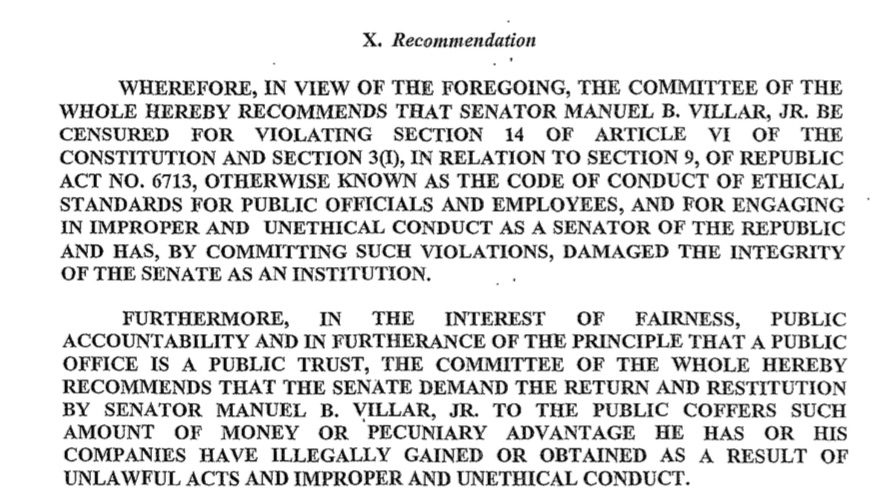SUMMARY
This is AI generated summarization, which may have errors. For context, always refer to the full article.

MANILA, Philippines – Nearly 30 years and numerous ethical complaints after the restoration of democracy in 1986, the Senate has so far censured only two senators.
Many complaints have been lodged against senators before the ethics panel but only former senators Juan Ponce Enrile and Heherson Alvarez were reproached in recent history. (READ: Ethics complaint vs De Lima? Issues of the ethics committee)
Former Senate President Manuel Villar, for his part, was also recommended to be censured for reportedly amassing profits from the controversial C5 extension projects.
But the chamber failed to act on the motion due to the lack of quorum, after Villar’s allies did not show up on the floor.
The Senate committee on ethics and privileges is mandated to look into “all matters relating to the conduct, rights, privileges, safety, dignity, integrity and reputation of the chamber and its members. “
This stemmed from the constitutional provision allowing Congress to “punish its members for disorderly behavior,” with the gravest penalty of suspension or expulsion.
The case of the wrong name
Based on documents Rappler obtained from the Senate Legislative Records and Archives Service, Enrile was the first senator post-EDSA to be censured by the Senate.
In 1988, then minority leader Enrile was reprimanded for wrongly naming Paul Aquino – brother of then Senator Agapito “Butz” Aquino and father of incumbent Senator Paolo Benigno Aquino IV – as chairman of Security Bank in one of his privilege speeches accusing then President Corazon Aquino’s relatives of “systematic looting.”
Paul Aquino wrote the Senate, denying his connection with the bank and seeking action against the senator.
Enrile owned up to the error, saying there was “no intention whatsoever to inflict malice on the Aquino name.”
Despite the public apology, Paul Aquino pushed through with his complaint and suggested that Enrile receive some “form of censure – suspension, reprimand, or reminder.”
The ethics panel promptly acted on the complaint and after two meetings, recommended that the chamber “remind and exhort [Enrile] to be more careful in the future.”

The committee report read: “A man’s name is priceless, more valuable than life itself, in fact. In the same manner that it is no excuse to say that someone did not mean to maim or kill a victim he has run over, to taint somebody else’s name because of lack of proper investigation could likewise be harmful, to say the least.”
It may have been a challenging decision at the time, as it was only a little over a year after the 1987 Constitution was adopted and it was a trying time for the country and the government. At the same time, the committee had to consider two of its peers, Aquino and Enrile.
In deciding to only reprimand Enrile, the panel said it opted to weigh the possible repercussions of a graver penalty.
The panel said that “the principle of uninhibited, robust, and wide-open debate on public issues,” may well include “vehement, caustic, and sometimes unpleasantly sharp attacks on government officials and public figures.”
Reprimanded for clearing police official
In 1996, a complaint was filed against then Senator Alvarez, chairman of the blue ribbon committee, for clearing a police official in the alleged pyramid scam in the Philippine National Police, while the Senate body was investigating it.
It was found that Alvarez, in the course of the congressional inquiry, wrote a letter to then National Police Director General Recardo Sarmiento, saying the committee “has not made any finding linking Chief Superintendent Virgilio Odulio to the alleged PNP scam” and that it “found no basis for his alleged involvement, knowledge nor participation in the anomalous transaction.”
The Senate ethics committee, then chaired by the late Senator Juan Flavier, recommended that the senator be “admonished” for sending the letter at a time when the inquiry was not yet over.

It also ruled that there was “lack of care” on the part of Alvarez when he did that and added that such acts “had exposed the Senate body to questions on its objectivity in the conduct of its investigations in aid of legislation.”
However, this threat was mitigated when the committee recommended the prosecution of Odulio, the committee said.
The panel also recommended that Alvarez be warned that “any similar transgression of this nature in the future will be dealt with more severely.”
Villar: Censured only on paper
In the months leading to the 2010 presidential elections, an ethics complaint was filed against then Senator Manuel Villar for allegedly accumulating profit from the controversial C5 extension project. At the time, Villar had already expressed his intention to run for president.
It was such a high-profile complaint that the Senate committee of the whole, not the ethics panel, took jurisdiction over the case.
The committee found that Villar violated the 1987 Constitution and Republic Act No. 6713 or the Code of Conduct of Ethical Standards for Public Officials and Employees, for failing to report a conflict of interest in the said project.
The panel also found that Villar “engaged himself in improper and unethical conduct that adversely reflects upon the Senate.”
It then recommended that the senator be censured for commiting acts that “damaged the integrity” of the chamber.

The panel also recommended that the Senate demand Villar to return to the public the amount of money he and his companies “illegally gained” from such transactions.
But the reprimand was only on paper, as Villar and his allies did not show up, leading to lack of quorum, on the day the Senate was set to vote on the recommendations.
Dismissed
Documents from the Senate archives identified other senators who faced a Senate probe but were later not found guilty.
These cases are different from those ethics complaints filed against senators but did not undergo any committee hearing and, therefore, had no committee reports.
During the 10th Congress, in 1996, then Senator Freddie Webb was investigated for alleged abuse of authority and violation of laws when he employed his son, Hubert, in the Senate Electoral Tribunal.
This was after the senator claimed that his son, one of the suspects in the Vizconde massacre, was in the United States then when his daily time record showed that he went to work, from 9 am to 6 pm.
In 2000, during the 11th Congress, the late senator Renato Cayetano faced two complaints for having appeared in the promulgation of the decision of the Vizconde case.
The ethics panel, then headed by Flavier, ruled that Cayetano did not violate the constitutional provision prohibiting members of Congress from appearing as counsel before any court.
The report said Cayetano appeared in court “in compliance of the Notice of Promulgation” he received and “for sentimental reasons,” as he was a lawyer for Lauro Vizconde prior to becoming senator. His act did not damage the Senate as an institution, it added.
Despite the favorable resolution for the senator, the committee “reminded” him and the others to be “more careful next time.”
A year later, Cayetano faced another complaint, this time for his alleged involvement in the trading and manipulation of BW shares while the Senate was investigating the matter. He was found not guilty.
In 2002, Flavier, a former ethics panel chair himself, faced a complaint for his alleged discourteous and insensitive conduct during an education event in Davao. It was dismissed after the committee found “no substantial credible evidence” against the late senator.
In the same year, then Senator Luisa Ejercito was accused of demanding money from a Filipino inventor in exchange for her endorsement of the product during her stint as First Lady. The committee junked the complaint, saying it had no jurisdiction over acts committed by members before joining the Senate.
Turning the other cheek?
In 2012, Senator Vicente Sotto III faced a complaint for supposedly plagiarizing parts of a blogger’s post in his speech during the controversial debates on the Reproductive Health bill.
Then Senator Pia Cayetano was also accused of plagiarism for her RH speech the same year.
Her brother, Senator Alan Peter Cayetano, who was the ethics committee chairman then, told the media they are studying the complaints against the two senators. In the end, nothing happened.
In December 2013, Senator Miriam Defensor Santiago lodged a complaint against Enrile for his supposed “disorderly behavior.”
At the time, however, the ethics committee was not constituted at the discretion of the leadership headed by then Senate Presidnt Franklin Drilon.
Santiago sent Drilon a letter, asking him to immediately organize the panel, which did not happen. The case, in short, did not prosper.
Now, with the pending complaint against neophyte Senator Leila De Lima, it remains to be seen how the ethics panel – considered the internal ombudsman of the chamber – would handle it.
As of posting, there has been one organizational committee meeting, with Sotto – committee ethics chair – saying they have yet to determine if they have jurisdiction over the matter and whether or not it has form or substance.
Aside from Sotto, the other members of the committee are Senators Panfilo Lacson, Gregorio Honasan, Grace Poe, Risa Hontiveros, Francis Escudero, and Loren Legarda. Sotto said Senator Manny Pacquiao, Duterte’s ally, might replace Legarda who is busy with budget deliberations as finance committee head.
Lacson and De Lima had a bitter past, as the former justice secretary launched a manhunt against Lacson in 2011 for being implicated in the murder of publicist Salvador “Bubby” Dacer and driver Emmanuel Corbito.
Pacquiao is a staunch ally of President Rodrigo Duterte, who has linked De Lima to illegal drugs.
Hontiveros, meanwhile, is an ally of De Lima, having run together under the banner of the Liberal Party.
Honasan, Poe, Escudero, and Legarda belong to the same bloc, as they are strong allies of Sotto. – Rappler.com
Add a comment
How does this make you feel?
There are no comments yet. Add your comment to start the conversation.